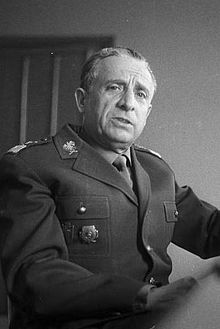Marian Spychalski
| Marshal of Poland Marian Spychalski |
|
|---|---|

Marian Spychalski in 1965
|
|
| Nickname(s) | Marek, Orka |
| Born |
6 December 1906 Łódź, Piotrków Governorate, Congress Poland |
| Died |
7 June 1980 (aged 73) Warsaw, Poland |
| Buried at | Warsaw, Poland |
| Allegiance |
|
| Years of service | 1944 - 1949, 1956 - 1968 |
| Rank | Marshal of Poland |
| Commands held |
Gwardia Ludowa Defence Minister |
| Battles/wars | World War II |
| Awards | |
| Other work | architect, politician |
Marian "Marek" Spychalski pronounced [ˈmarjan spɨˈxalskʲi] (6 December 1906 – 7 June 1980) was a Polish architect in pre-war Poland, and later, military commander and communist politician. During World War II he belonged to the communist underground forces operating within Poland and was one of the leaders of the resistance movement Gwardia Ludowa (People's Guard), then Armia Ludowa (People's Army).
Born to a working-class family in Łódź, Spychalski graduated from the Faculty of Architecture of the Warsaw University of Technology (Politechnika Warszawska) in 1931. That same year he joined the Communist Party of Poland (KPP), and kept his membership after the Nazi-Soviet invasion, when in 1942 KPP became the Polish Workers' Party, renamed in 1948 as the Polish United Workers' Party. Before World War II, he practised architecture and won several national and international competitions and awards.
After World War II, he held a number of offices in the government of Poland, one of his first being mayor of Warsaw (18 September 1944 – March 1945), with the war still in progress. Among other posts, he was a long-time member of the Sejm (parliament), a close friend of Władysław Gomułka, and from 1945 to 1948 was both Deputy Minister of Defense and a member of the Politburo of the Polish United Workers' Party.
He was removed from his remaining political posts in 1949 and then in 1950 imprisoned as part of the Stalinist purges of social-democrats in 1949–1953, where he was accused of anti-Soviet tendencies akin to Titoism. In 1951 he appeared in a show trial where he was instructed to deliver official (and false) testimony against Gomułka. He was only released in the mass release of political prisoners in April 1956, and subsequently reinstated in the Polish United Workers' Party.
...
Wikipedia
